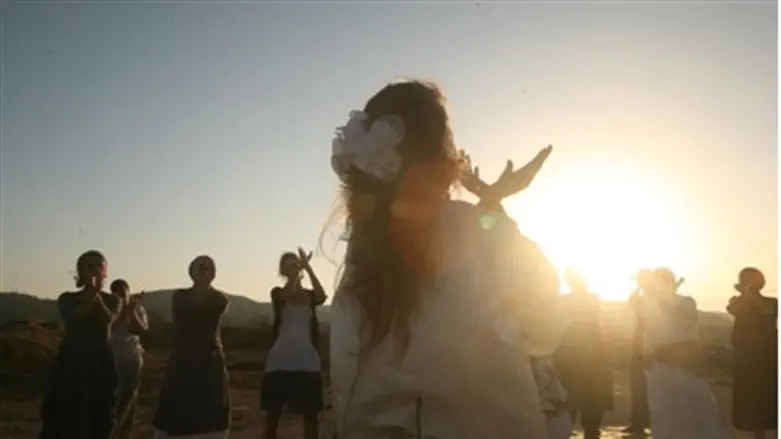
“We are such fragile beings
And my friend the Rose
Said to me this morning
I was born at the sunrise…
I came into bloom
Happy and in love
In the rays of sunshine
I closed up at night
And I woke up old
Yet I was still very beautiful….
We are such fragile beings
And my friend the Rose
Died this morning…
And I saw her in my dreams
Dazzling and bare
Her spirit was dancing
Well beyond the sky above
And she was smiling at me
Believe he who can believe
Me, I need hope
Otherwise, I am but nothing…
(Mon Amie La Rose- Cecile Caulier)
The month of Av. A month characterized by the all-pervasive feeling of mourning, of desolation. This year, the feeling was palpable, visible. We could see the strife surrounding the walls of Jerusalem, the enmity, chaos and danger which in years gone by led to its destruction and the dispersal of our people.
We saw scenes of destruction. Of walls collapsing, of buildings in ruin, though in a different country, the parallels in time were striking. A feeling of gloom, of despondency. What had once been was now but a heap of rubble and ash.
A reminder. Life and death are not in our hands. Illness, war, calamities. The precariousness of the ground upon which we walk, which may suddenly crumble and reveal to us life in its true frailty and vulnerability.
Intrinsic to the nature of life. To the nature of the world. ”I form the light, and create darkness: I make peace, and create evil: I the Lord do all these things.” (Isaiah 45:7)
And yet. In the very fragility of life lies the mystery, the wonder, the hope, the light.
“Forget your perfect offering. There is a crack in everything. That's how the light gets in.” (Leonard Cohen)
Tisha B’Av is followed by Tu B’Av. The night of a full moon. An end to the doom and gloom of the prior period in time. A reminder of the ultimate resolution of the forty years of wandering of our people in uncertainty, in despair alternating with hope. A day of joyous celebration which heralds our entrance to the Promised Land. The holiday of love, of romance and flowers.
We sense the approaching month of Elul. The month of hope, of renewal and return. The month in which God and His People rediscover one another. When God waits for us, and we in turn, are waiting for Him. For redemption and salvation, for forgiveness.
The Hebrew letters of the word Elul are considered to be an abbreviation for the phrase Ani Ledodi Vedodi Li. “I am my beloved’s and my beloved is mine”.
In this spirit, according to the Talmud (Ta’anit), there were no holy days as happy as Tu B’Av and Yom Kippur. On both Tu B’Av and Yom Kippur the unmarried girls of Jerusalem would go out to dance in the vineyards, dressed in white garments.
And now, as the month of Elul approaches. What will be our fate this year? What will it be? Will we continue to be trapped in a cycle of illness, death, and destruction? Or are we entering a period of renewed faith, strength, salvation? Will the flowers of Tu B’Av wither or blossom?
May we be blessed with the blessings of Psalm 27, intrinsic to the month of Elul.
“The LORD is my light and my salvation; whom shall I fear? The LORD is the stronghold of my life; of whom shall I be afraid?” (Psalms 27:1)
According to tradition, the word ori, ‘my light’, refers to Rosh Hashanah whereas the word yishi ‘my salvation’ refers to the forgiveness given on Yom Kippur. (Midrash Tehilim) . The redemption which will be our blessing.
“One thing I ask of the LORD, this is what I seek: that I may dwell in the house of the LORD all the days of my life, to gaze upon the beauty of the LORD and to seek Him in His Temple.
For in the day of trouble He will keep me safe in His dwelling; He will hide me in the shelter of His tabernacle and set me high upon a rock….
I am still confident of this; I will see the goodness of the LORD in the land of the living.
Wait for the LORD; be strong and take heart and wait for the LORD.” (Psalm 27: 4-14)
May we be worthy of the blessings of Life in its fullness. The ever-embracing Divine Love which provides us with health, life, vitality and strength. The ability to share joy, laughter and the goodness of life with others. May we be blessed with the gifts of hope and optimism, always.
In days gone by, the blessing “Ketiva Vehatima Tova” was used as a greeting from Tu B’Av until Rosh Hashanah.
Now as then, “May your inscription and seal be for good”.
And may the flowers of Tu B’Av eternally bloom.
“As a rose among the thorns, so is my beloved among the daughters”. (Song of Songs 2:2)
Dr. Devorah Ungar is an American-born scientist and musician.who moved to Israel 30 years ago.